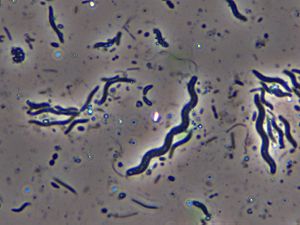Nitrosomonadales facts for kids
Quick facts for kids Nitrosomonadales |
|
|---|---|
 |
|
| Spirillum | |
| Scientific classification | |
| Domain: | |
| Phylum: |
Pseudomonadota
|
| Class: |
Betaproteobacteria
|
| Order: |
Nitrosomonadales
Garrity et al. 2006
|
| Families | |
|
|
The Nitrosomonadales are a group of tiny living things called bacteria. They are so small you need a microscope to see them! These bacteria belong to a larger group called Betaproteobacteria. Like many bacteria, they are "Gram-negative". This means they have a special cell wall that doesn't hold a certain purple dye used in labs.
Contents
What are Nitrosomonadales?
Nitrosomonadales are an order of bacteria. Think of an order like a big family tree for living things. They are part of the Betaproteobacteria class, which is a major group within the Bacteria kingdom.
Different Types of Nitrosomonadales
This order of bacteria is split into six main families. Each family contains different types of bacteria, called genera (plural of genus).
Nitrosomonadaceae Family
This family includes bacteria like Nitrosomonas, Nitrosolobus, and Nitrosospira. The Nitrosomonas genus is very important.
Methylophilaceae Family
In this family, you'll find bacteria such as Methylophilus, Methylobacillus, and Methylovorus.
Spirillaceae Family
This family mainly includes the genus Spirillum.
Thiobacillaceae Family
This group contains bacteria like Thiobacillus, Annwoodia, and Sulfuritortus.
Gallionellaceae Family
Here you'll find Gallionella, Ferriphaselus, Sulfuriferula, Sulfurirhabdus, and Sulfuricella.
Sterolibacteraceae Family
This family includes Sterolibacterium, Sulfurisoma, Denitratisoma, Sulfuritalea, Georgfuchsia, and Methyloversatilis.
How Nitrosomonadales Help Our Planet
Many Nitrosomonadales bacteria play a super important role in keeping our planet healthy. They help recycle important chemicals in nature. This process is called biogeochemical cycling.
The Nitrogen Cycle
Bacteria from the Nitrosomonas genus are key players in the nitrogen cycle. They change ammonium (a chemical found in soil and water) into nitrite. This process is called nitrification. It's a vital step that helps plants get the nitrogen they need to grow.
The Sulfur Cycle
Other bacteria, like Thiobacillus and Annwoodia, are involved in the sulfur cycle. They can change different forms of sulfur (like thiosulfate and sulfide) into sulfate. This helps move sulfur through the environment.
The Carbon Cycle
Some Nitrosomonadales, like Methylophilus, are called methylotrophs. They can break down compounds like methanol into carbon dioxide. This is an important part of the carbon cycle, which moves carbon through the air, land, and water.
The Iron Cycle
Bacteria such as Gallionella and Ferriphaselus are involved in the iron cycle. They can change ferrous iron (a type of iron) into ferric hydroxide. This process helps move iron through the environment and is also linked to the carbon cycle.
Because of all these jobs, Nitrosomonadales are very important for how elements move and change on Earth. They help keep many natural processes running smoothly.
See also
 In Spanish: Nitrosomonadales para niños
In Spanish: Nitrosomonadales para niños
 | William L. Dawson |
 | W. E. B. Du Bois |
 | Harry Belafonte |

